How can you make life decisions through the lens of ikigai?
In this episode of the Ikigai Podcast, Nick speaks with Christopher Tan about how the concept of ikigai can guide people in making life choices that lead to greater meaning and fulfillment.
Podcast Highlights
- Christopher’s background. Chris shares a brief overview of his background.
- Joining the army. Chris shares his experience serving six years as an army officer.
- Working in insurance. Chris discusses his journey into the insurance industry.
- A life-changing experience. Chris shares how a conversation with a client transformed his life.
- Venturing out on his own. Chris discusses how he founded his own wealth management firm.
- The impact of the Lehman Brothers collapse. Chris shares how it affected his company.
- Philosophy of sufficiency. Chris discusses his business's philosophy of sufficiency.
- Becoming drawn to ikigai. Chris shares what inspired him to explore the concept of ikigai.
- Ikigai decisions. Chris explains how he coined the term ikigai decisions.
- Aligning wealth with meaningful living. Chris shares how people can use their wealth to cultivate more ikigai in their lives.
- Christopher’s ikigai. Chris talks about his sources of ikigai.
Christopher Tan

Christopher Tan is the Group CEO of Providend, a fee-only wealth advisory and licensed fund management firm in Singapore. With over 20 years in wealth management and financial planning, he is a respected voice in the media, regularly featured in major publications and interviewed on TV channels like Channel NewsAsia and CCTV.
Christopher is also a sought-after speaker both locally and internationally, including at the CFA Institute Annual Conference. In addition to his professional achievements, he is a certified Ikigai Tribe coach.
LINKS:
Christopher’s background
Chris is the only son among four siblings and grew up second in line, with one older and two younger sisters. The family lived in a small two-bedroom flat—one room for the parents, and initially, all four kids shared the other. As they got older, Chris gave up the room to his sisters and began sleeping on the living room floor.Despite financial struggles, their parents—especially his late mother—managed money well and ensured the children never felt deprived. Chris recalls a happy childhood and shares that he and his sisters remain close, maintaining a strong bond through regular family chats even after their parents' passing.
Joining the army
In Singapore, military service is mandatory for young men, and after completing the standard two-and-a-half-year term, most move on to university. Chris, however, chose to stay on and became an army officer. He discovered a passion for leading troops, training in the field, and participating in exercises.
Practical needs also influenced his decision—he wanted to change careers from engineering, which he didn’t enjoy, and needed money to fund part-time studies in finance, as his family couldn’t afford overseas education.
Chris served for six and a half years, gaining not only financial stability but also invaluable leadership skills, which he credits as the foundation for 80% of his leadership knowledge today. He remains deeply grateful to the army for supporting his growth, education, and early family life.
Working in insurance
Chris didn’t enter insurance immediately after leaving the army in December 1996. Initially, he aimed for a career in financial services, but the 1997 Asian financial crisis made jobs scarce. Needing work to support his new marriage, he joined Johnson & Johnson’s pharmaceutical division as a medical sales representative.
After about 15 months, he realized his true passion lay in personal finance. In March 1998, he transitioned into financial services by joining an insurance company. Starting without a fixed salary, Chris relied on commissions and faced financial struggles early on—he once had just $21.59 left in his bank account.
However, he quickly found success. Within nine months, he became the second top rookie advisor at his firm and qualified for the prestigious Million Dollar Round Table (MDRT), a significant achievement, especially during the post-crisis period. By his third year, he was earning around SGD 200,000 annually—a remarkable income for a 30-year-old at that time.
A life-changing experience
At 30, Chris met with a long-time client who, after declining a proposal, remarked that at some point he wouldn’t need any more insurance. The comment hit hard—Chris realized the client had been supporting him, not the other way around.
Though he was earning well, he felt unfulfilled, having strayed from his goal of offering comprehensive financial planning. A few months later, inspired by that moment, Chris left the insurance company to start his own venture.
Venturing out on his own
In 2001, Chris founded Providend, inspired by fee-only advisory models in countries like Australia and the U.S. Partnering with a former colleague, he aimed to offer unbiased, client-first financial advice. However, Singapore had yet to implement the necessary licensing laws, delaying their official approval.
Providend launched on September 11, 2001—the day of the 9/11 attacks—which further delayed regulatory progress. It wasn't until May 2003 that they received their license. Despite the setback, Chris stayed committed to building a transparent, client-focused firm.
The impact of the Lehman Brothers collapse
By 2008, Providend managed 258 million in assets, but the global financial crisis slashed that to 160 million in just three months. Revenue fell, staff morale dropped, and clients panicked. Chris describes it as one of the hardest times in his life, managing both angry clients and a shaken team.
In early 2009, during their annual client event, Chris chose transparency over legal caution. He publicly apologized and committed to rebuilding trust and improving processes—an approach that helped retain many clients.
Since then, Providend has overhauled its investment strategy, navigated future downturns well, and delivered strong performance. Chris stands by his decision, believing that integrity during tough times is what truly builds lasting trust.
“Your journey speaks of rolefulness—you’ve found your place in the financial and wealth management industry, where you’ve been clear about who you want to be, how you want to behave, how you want to treat your clients, and how you want to carry yourself. I believe you’re unique in this role.” - Nicholas Kemp
Philosophy of sufficiency
Chris developed his philosophy of sufficiency after an epiphany following the 2008 Global Financial Crisis. He had a strong inner feeling—what he believes was a message from God—about how money has been used in harmful ways. This made him think deeply about how we live and manage our money.
The philosophy of sufficiency is about knowing what is enough. It’s not about giving up, but about choosing what really matters in life and making financial decisions that support those things. Since we can’t have everything, we need to focus on what brings true value and meaning.
In 2010, Chris put this into practice. He simplified his life by moving from private to public housing, going from two cars to one, and using public transport. This gave him more freedom and less financial stress.
His main message is: make life decisions first, then make financial decisions to support them—not the other way around. This idea now guides how he helps his clients plan their lives and finances for better long-term success.
"We must always make life decisions before financial decisions; our financial decisions must enable our life decisions and not the other way around." - Christopher Tan
Becoming drawn to ikigai
Chris had long been searching for better ways to guide clients in making meaningful life decisions. Although he had developed his own model, he found it clumsy and was seeking something clearer and more effective.
He initially believed, like most people, that ikigai was represented by the popular four-circle Venn diagram and even bought books on it. However, when he discovered Nick’s Ikigai Tribe and learned that true ikigai is not based on the Venn diagram, he was surprised but deeply intrigued. This new understanding challenged his previous beliefs and sparked a strong desire to explore the real meaning of ikigai.
That curiosity led him to reach out to Nick, join the program, and begin a new journey of learning—one he describes as a turning point.
Ikigai decisions
“Life decisions are ikigai decisions.” - Christopher Tan

For a long time, Chris struggled to help people make life choices because he didn’t have a clear way to guide them. He used to think everyone needed one big life purpose, but found that idea made many people feel lost or discouraged.
When he learned about having sources of ikigai—especially the idea of small, meaningful joys like drinking coffee or walking in the park—it changed everything. He saw that life decisions could be about supporting these simple, valuable moments.
As a certified Ikigai Tribe coach, Chris began sharing this idea of ‘ikigai decisions’ with his clients. Even though many of his clients are wealthy, they understand that life goals should come before financial goals.
Aligning wealth with meaningful living
Chris emphasizes that while not all ikigai requires money, some do—and it's essential to recognize which aspects of meaningful living depend on financial resources. He advises people to first identify their ikigai decisions, then evaluate their finances to support those goals.
For dreams that require time off or career changes, like moving abroad or starting a project, it’s important to plan ahead financially—whether by saving more or cutting expenses. Ultimately, clarity about one’s goals should guide financial decisions.
Christopher’s ikigai
Chris shares that his personal ikigai comes from simple, joyful routines outside of work. Each week, he visits a City Club—his ibasho—where he relaxes and connects with others. He finds joy in wine (especially learning about its history), reading, listening to music, and exercising regularly. Weekend breakfasts with his family, especially his adult children, are particularly meaningful.
Conclusion
Identifying our ikigai sources is essential to making meaningful life decisions. When we align our choices with what brings us purpose and joy, we gain clarity on what truly matters. Ikigai decisions guide us not just in one area, but across all aspects of life—offering both motivation and fulfillment.
